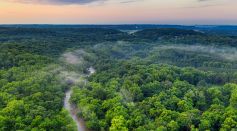ENVIRONMENT & CLIMATE

Reddit WallStreetBets Users Adopt Gorillas, Donates More Than $250,000 to Gorilla Conservation

Pollen Raises Vulnerability to COVID-19 Infection, Research Finds

Is the Amazon Rainforest Making Climate Change Worse?
Confidential Cold War Project Rewrote Greenland's Past and Gives Warnings About The Future

Ocean Oil Spills Photooxidizes Much Faster Than Previously Thought
Scientists Propose New Method for Finding Rare Earth Deposits

Compulsory Nature Studies Now Being Considered by Government to Introduce to Students from All Levels

Climate Change and Erosion: How to Save the Earth from These Problems
Narwhals: The Unicorn of the Arctic's Tusks Reveal Truth About This Bizzare Porpoise
Penguin Saves Himself From Killer Whale in Antarctica; Here's How It Jumped Itself Onto Boat [WATCH]
Cone Snails Attract Worms Only To Become a Meal

Over 30 Tasmanian Devil Roadkill Deaths in Woolnorth Road Found to Be Caused by Tumor Disease

Dead Raccoons Reported in Arlington, Animals With Neurological Signs Tests Postive for Canine Distemper
Remains in Ancient Massacre Site Examined, Genetic Analysis Reveals Large Scale Indiscriminate Killing
Most Popular

Blood Moon to Appear During Total Lunar Eclipse on March 3, 2026

The Science of Aging: What Cellular Aging and Telomeres Reveal About Human Longevity

NASA Reveals an Astronaut Was Medically Evacuated From the ISS for the First Time After a Non-Emergency Health Scare

How Volcanoes Destroy, Build Land, and Shape Earth's Surface and Climate





